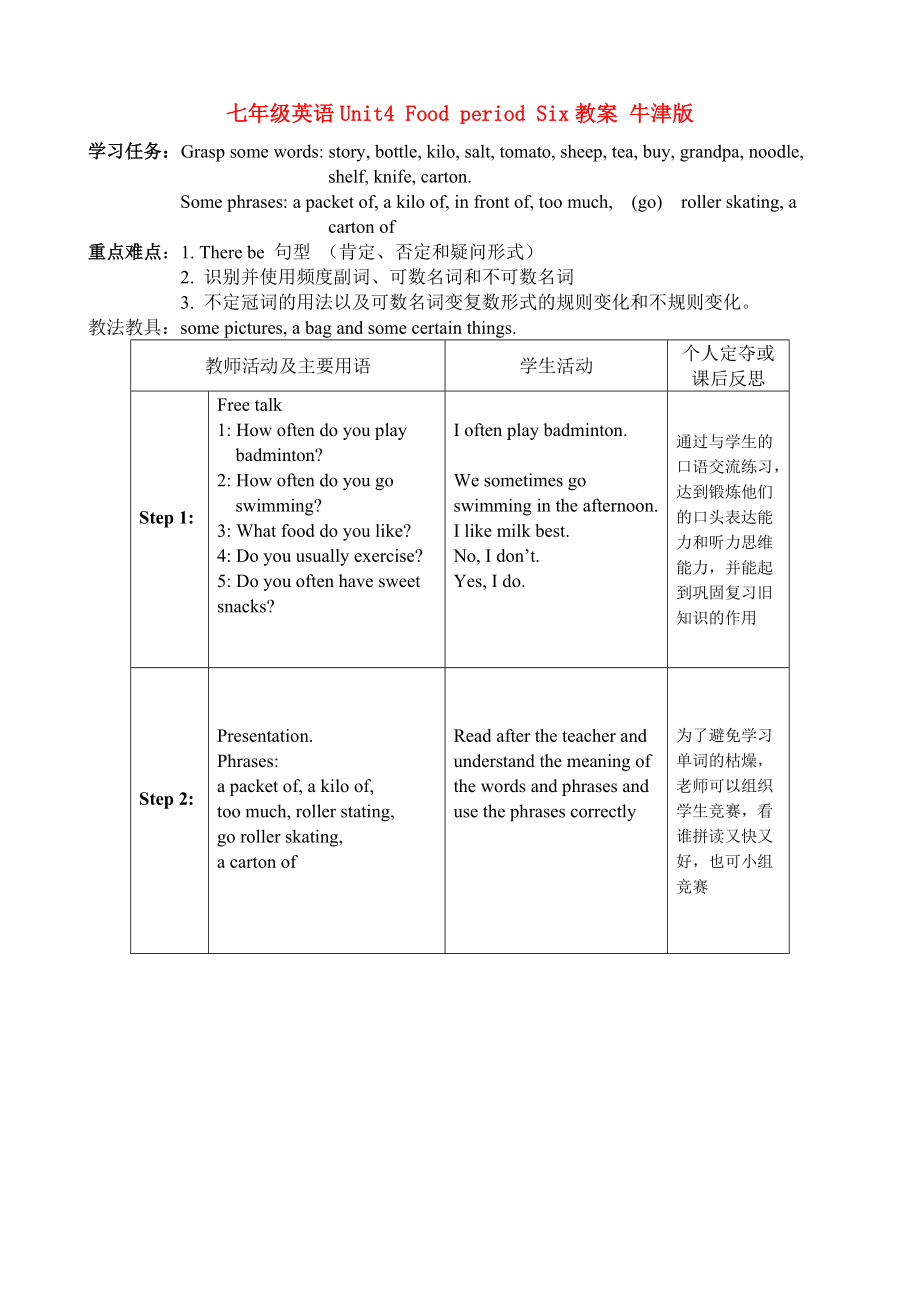《七年級(jí)英語(yǔ)Unit4 Food period Six教案 牛津版》由會(huì)員分享��,可在線閱讀�����,更多相關(guān)《七年級(jí)英語(yǔ)Unit4 Food period Six教案 牛津版(2頁(yè)珍藏版)》請(qǐng)?jiān)谘b配圖網(wǎng)上搜索���。
1�、七年級(jí)英語(yǔ)Unit4 Food period Six教案 牛津版
學(xué)習(xí)任務(wù):Grasp some words: story, bottle, kilo, salt, tomato, sheep, tea, buy, grandpa, noodle, shelf, knife, carton.
Some phrases: a packet of, a kilo of, in front of, too much, (go) roller skating, a carton of
重點(diǎn)難點(diǎn):1. There be 句型 (肯定�����、否定和疑問(wèn)形式)
2、 2. 識(shí)別并使用頻度副詞���、可數(shù)名詞和不可數(shù)名詞
3. 不定冠詞的用法以及可數(shù)名詞變復(fù)數(shù)形式的規(guī)則變化和不規(guī)則變化����。
教法教具:some pictures, a bag and some certain things.
教師活動(dòng)及主要用語(yǔ)
學(xué)生活動(dòng)
個(gè)人定奪或課后反思
Step 1:
Free talk
1: How often do you play badminton?
2: How often do you go swimming?
3: What food do you like?
4: Do you usually exercise?
3����、5: Do you often have sweet snacks?
I often play badminton.
We sometimes go swimming in the afternoon.
I like milk best.
No, I don’t.
Yes, I do.
通過(guò)與學(xué)生的口語(yǔ)交流練習(xí),達(dá)到鍛煉他們的口頭表達(dá)能力和聽力思維能力�,并能起到鞏固復(fù)習(xí)舊知識(shí)的作用
Step 2:
Presentation.
Phrases:
a packet of, a kilo of,
too much, roller stating,
go rol
4��、ler skating,
a carton of
Read after the teacher and understand the meaning of the words and phrases and use the phrases correctly
為了避免學(xué)習(xí)單詞的枯燥���,老師可以組織學(xué)生競(jìng)賽���,看誰(shuí)拼讀又快又好,也可小組競(jìng)賽
1. T: Do you have milk for breakfast every day? Oh, I see.
You always have milk for breakfast.
2. Please loo
5�����、k at P64 ,and think over.
3. Let the students say some sentences using “always, often, usually”, etc.
Yes, we always have milk for breakfast.
Do the exercises on P64.
I am never late for school.
I always run in the morning.
I often play basketball after school but I seldom play footba
6�、ll.
讓學(xué)生通過(guò)學(xué)習(xí)與觀察�,自己歸納頻度副詞之間關(guān)系
Step 3:
Presentation:
1. (將各種物品放在一個(gè)口袋里)
I have a bag here. What do I have in it? Can you guess?
同時(shí)教授新單詞和詞組:
salt, tomato, potato, sheep, tea, buy, grandpa, noodle, shelf, knife, carton
2.(用口袋里的東西呈現(xiàn)可數(shù)名詞復(fù)數(shù)以及量詞的正確使用)
T: How many apples do I have?
T: How many ba
7�、gs of milk do I have?
You have a/an ……
You have a bottle of ……
閱讀P65B部分表格
Do exercises on P66
讓學(xué)生區(qū)分可數(shù)名詞與不可數(shù)名詞,并總結(jié)a/an 的使用規(guī)則��。(P65B)
讓學(xué)生掌握可數(shù)名詞變復(fù)數(shù)的規(guī)則變化和不規(guī)則變化
Step 4:
1. 傳授there be 句型�,讓學(xué)生利用教室里的物品造句。
2. Is there …����?
Are there …?
There is a teacher’s desk in our classroom.
There are two blackboards in our classroom.
There are …
Yes/No 幫助進(jìn)一步回答:
There isn’t …
There aren’t …
通過(guò)課堂表演形式活躍課堂的氣氛,并能讓學(xué)生達(dá)到學(xué)以致用的目的�。
Step 5:
Exercises on P67
閱讀P67C部分表格
教后感
 七年級(jí)英語(yǔ)Unit4 Food period Six教案 牛津版
七年級(jí)英語(yǔ)Unit4 Food period Six教案 牛津版

